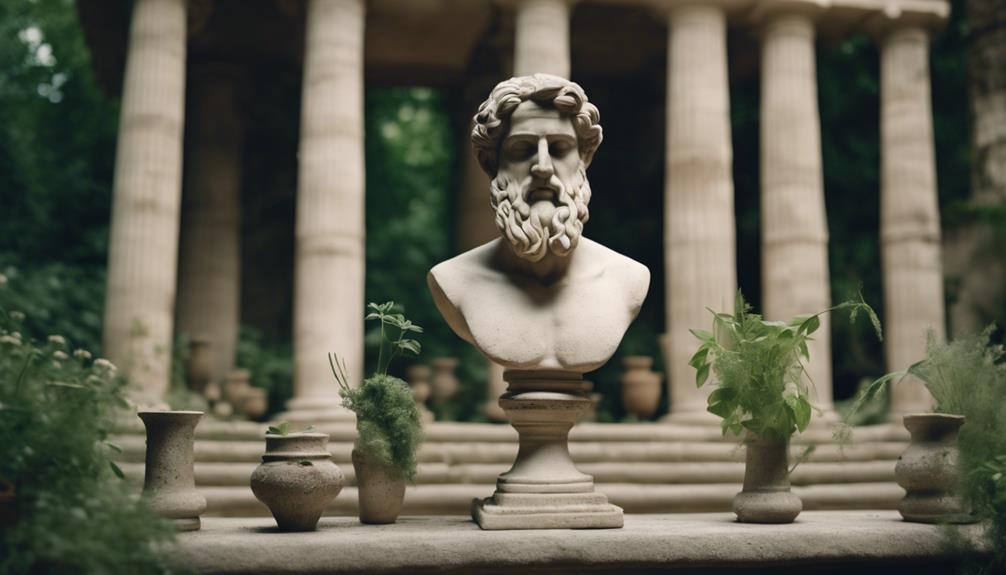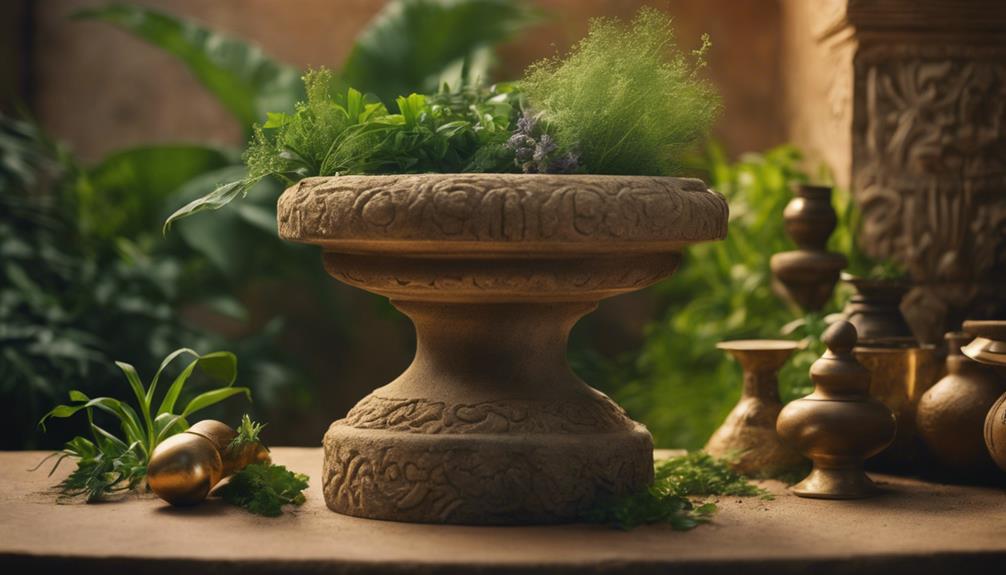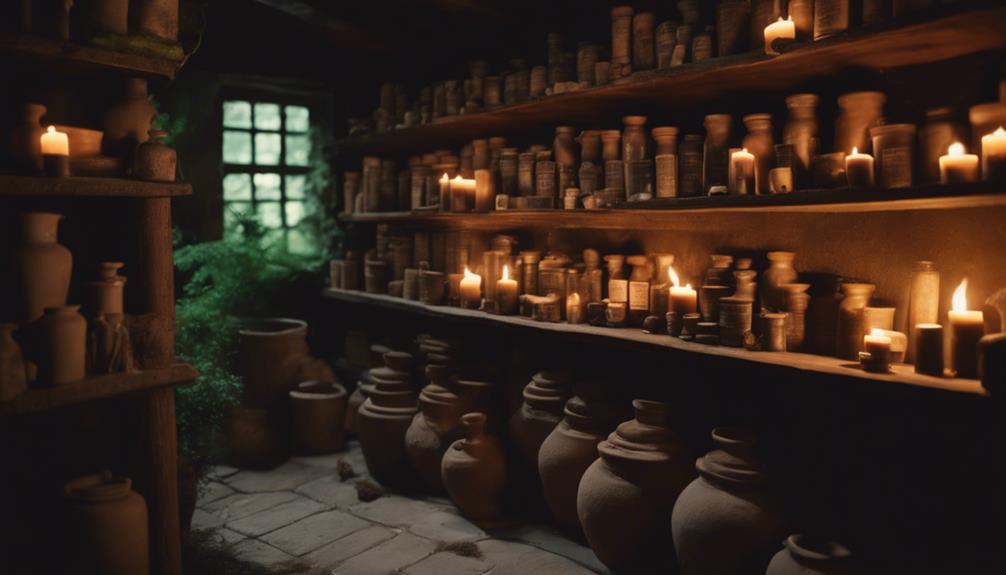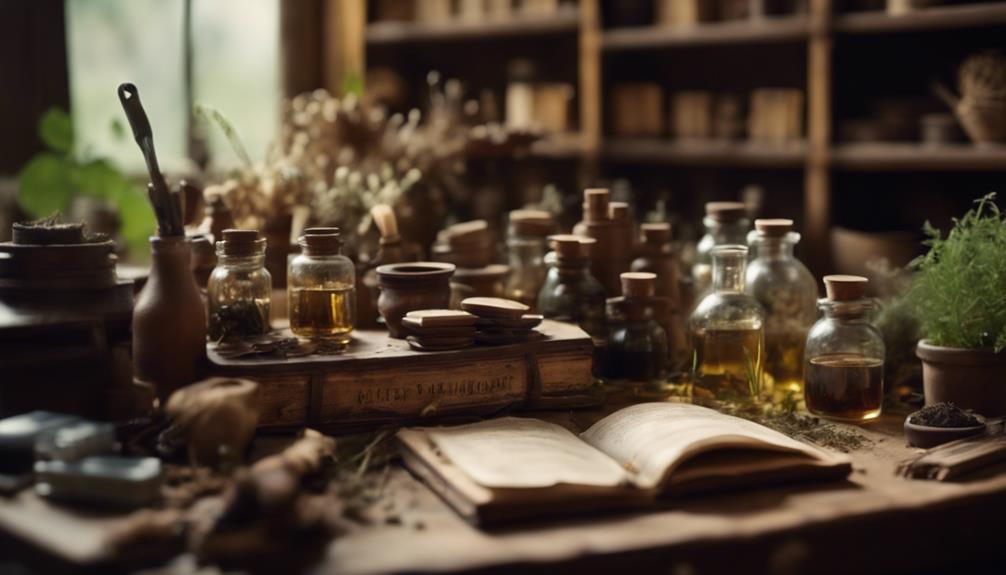As we explore the origins of herbalism, we find that ancient civilizations like the Egyptians, Greeks, and Chinese laid the groundwork for this traditional practice. The Ebers Papyrus from 1550 BCE is one of the earliest recorded documents detailing the use of medicinal herbs. Greek physicians like Hippocrates, Theophrastus, and Dioscorides expanded herbal medicine knowledge, while ancient Chinese medicine focused on balancing Yin and Yang energies with herbs. Their contributions shaped the course of medicinal history, and as we examine their collective efforts, we begin to uncover the rich heritage of herbalism that spans centuries and cultures.
Key Takeaways
• Ancient civilizations, including Egyptians, Greeks, and Chinese, laid the groundwork for herbalism, documenting medicinal herbs and shaping medicinal history.
• The Ebers Papyrus from ancient Egypt (1550 BCE) detailed hundreds of medicinal plants, while Greek physicians like Hippocrates and Dioscorides expanded herbal medicine knowledge.
• Greek philosophy influenced herbal medicine practices with a holistic approach, and notable figures like Galen and Pliny enriched herbal medicine knowledge.
• Islamic medicine and monastic herbalists in Benedictine monasteries contributed to the preservation and dissemination of herbal knowledge during the Middle Ages.
• The integration of traditional herbal knowledge with contemporary scientific research has led to the evolution of modern herbalism, incorporating evidence-based medicine and individualized prescriptions.
Ancient Roots of Herbalism
As we explore the rich history of herbalism, we find that ancient civilizations laid the groundwork for this timeless practice, recognizing the profound healing properties of plants that would shape the course of medicinal history.
The ancient texts of the Egyptians, Greeks, and Chinese provide valuable insights into the early development of herbal knowledge. The Ebers Papyrus, dating back to 1550 BCE, is a reflection of the Egyptians' in-depth understanding of medicinal herbs.
In ancient Greece, Hippocrates and his fellow physicians made significant contributions to the field, establishing a strong foundation for the herbal tradition that would shape the history of Western medicine. The ancient Greek physicians, including Theophrastus, Dioscorides, and Galen, greatly expanded our understanding of herbal medicine, laying the groundwork for modern practices.
Through their collective efforts, these ancient civilizations have left an enduring legacy, providing a solid foundation for the development of herbalism as we understand it today.
Early Civilizations and Herbalism

We explore the rich cultural heritage of early civilizations, where the ancient Egyptians, Chinese, and Greeks thoroughly investigated a profound understanding of herbalism that would shape the course of medicinal history.
These ancient societies recognized the healing properties of various plants, extensively studying and documenting their medicinal uses. In ancient Egypt, herbal medicine was a cornerstone of healthcare, as evidenced by the Ebers Papyrus, which details hundreds of medicinal plants.
Similarly, Chinese medicine, with a history spanning over 2,500 years, focuses on balancing Yin and Yang energies using a wide range of herbs and formulas. The History of Herbalism is deeply rooted in these early civilizations, where plants were used to create herbal remedies that treated a variety of ailments.
The Greek Legacy in Herbalism

Expanding upon the foundational knowledge of ancient civilizations, we explore the significant contributions of the Greeks, whose pioneering work in herbalism paved the way for a deeper understanding of plant-based medicine.
Greek herbalists like Theophrastus and Dioscorides laid the groundwork for herbal medicine with detailed plant descriptions, which remain valuable resources to this day. The father of medicine, Hippocrates, emphasized the use of plants in treating diseases, solidifying the importance of herbalism in medical practices.
Greek philosophy, particularly the concept of the Kosmos and interconnectedness of all things, influenced herbal medicine practices, highlighting the holistic approach to health.
Notable figures like Galen of Pergamon contributed to our understanding of the human body and circulation in herbal medicine. Additionally, writers such as Pliny, Celsus, and Soranus enriched the knowledge base of herbal medicine with their contributions.
The Greek legacy in herbalism is undeniable, and their pioneering work continues to shape our understanding of plant-based medicine today.
Herbalism in Ancient Cultures

Beyond Greece, other ancient civilizations made notable contributions to the development of herbalism. We find that ancient civilizations like Egypt, China, and Greece played pivotal roles in shaping the field. The Ebers Papyrus from 1550 BCE documented hundreds of medicinal plants used by the ancient Egyptians, showcasing their advanced understanding of herbal remedies.
| Ancient Civilization | Contribution to Herbalism |
|---|---|
| Egypt | Documented hundreds of medicinal plants in the Ebers Papyrus |
| China | Developed Traditional Chinese Medicine, emphasizing herbal remedies |
| Greece | Laid the foundation for modern herbal practices through Hippocrates' work |
We see that Traditional Chinese Medicine has a rich history of over 2,500 years, emphasizing herbal remedies to restore balance in the body. Meanwhile, Hippocrates, an ancient Greek physician known as the 'father of medicine,' advocated for using plants to treat diseases. Greek herbal knowledge laid the foundation for modern herbal practices, contributing significantly to the field's evolution. By exploring these ancient civilizations' contributions, we gain a deeper understanding of the roots of herbalism.
Medieval Period of Herbalism

As we explore the medieval period, the preservation and dissemination of herbal knowledge flourished through the diligent work of scholars like Dioscorides and monastic herbalists. During this time, Benedictine monasteries played an essential role in preserving and disseminating herbal knowledge, particularly in Europe.
In fact, herbal practices were mainly documented and practiced by women in Germanic tribes during the medieval period.
Here are some key highlights of the medieval period of herbalism:
- Influence of Islamic medicine: The Middle Ages saw a significant impact of Islamic medicine, particularly from Avicenna, on herbal practices in Europe.
- Translation of ancient texts: Translating ancient herbal texts from Arabic to Latin in the Middle Ages contributed to the growth of herbal knowledge in Europe.
- Monastic herbalists: Monastic herbalists, like those in Benedictine monasteries, played a crucial role in preserving and disseminating herbal knowledge.
- Herbal practices in Europe: The medieval period saw the expansion of herbal practices in Europe, with a focus on the practical application of herbal remedies.
Through the work of scholars, monastic herbalists, and women in Germanic tribes, the medieval period marked a significant milestone in the development of herbalism.
The Renaissance of Herbal Medicine

As we explore the Renaissance of herbal medicine, we find ourselves at a crossroads where ancient practices are revived and merged with emerging scientific discoveries.
This era marks a significant shift towards more accessible herbal knowledge, paving the way for herbalism to evolve in modern times.
We'll examine how the Renaissance period's unique blend of traditional wisdom and innovative botanical studies has shaped the course of herbal medicine.
Revival of Ancient Practices
During the Renaissance, we witnessed a remarkable resurgence of interest in ancient herbal practices, as scholars and herbalists explored dusty archives to uncover and translate long-forgotten texts on herbal medicine. This revival marked a significant turning point in the history of herbalism, as it brought ancient knowledge back into the spotlight.
Here are some key aspects of this resurgence:
- Rediscovery of ancient works: Herbalists and scholars translated and studied ancient texts, uncovering valuable insights into herbal medicine.
- Renewed focus on herbal remedies: The Renaissance saw a renewed interest in the study and application of herbal remedies, paving the way for modern herbal medicine.
- Reintegration of ancient knowledge: Herbal knowledge from ancient civilizations was reintegrated into medical practices, enriching the understanding of herbal medicine.
- Foundation for modern herbalism: The Renaissance revival laid the groundwork for modern herbalism, shaping the course of herbal medicine for centuries to come.
This revival of ancient practices not only revitalized interest in herbal medicine but also laid the foundation for the evolution of herbalism in the centuries that followed.
Herbalism in Modern Times
We've witnessed a remarkable resurgence of interest in herbal medicine in modern times, a development that echoes the Renaissance revival of ancient practices. This renewed enthusiasm, dubbed the Renaissance of Herbal Medicine, has been building momentum since the 20th century. As people sought natural alternatives to conventional treatments, herbal remedies and traditional healing practices gained popularity.
| Era | Development | Characteristics |
|---|---|---|
| 20th century | Renewed interest in herbal medicine | Shift towards natural alternatives |
| Modern times | Renaissance of Herbal Medicine | Blending traditional wisdom with scientific advancements |
| Present day | Growing popularity of herbalism | Holistic approaches to health and wellness |
| Future outlook | Integration of herbalism with modern medicine | Evidence-based validation of herbal remedies |
Herbalists have adapted ancient knowledge to modern contexts, blending traditional wisdom with scientific advancements. This fusion has led to a shift towards holistic and natural approaches to health and wellness. As we move forward, we can expect to see a deeper integration of herbalism with modern medicine, further validating the efficacy of herbal remedies through evidence-based research.
Evolution of Modern Herbalism

In our pursuit of effective healthcare, modern herbalism has evolved to seamlessly merge traditional wisdom with cutting-edge scientific discoveries. This integration has enabled herbalists to provide more effective treatments, combining ancient healing practices with evidence-based medicine.
As we continue to advance in our understanding of botany, pharmacology, and holistic health, modern herbalism adapts to incorporate these new discoveries.
Here are some key aspects of modern herbalism:
- Integration of traditional herbal knowledge with contemporary scientific research: Herbalists combine ancient practices with modern scientific understanding to provide effective treatments.
- Individualized prescriptions: Herbal prescriptions are tailored to address specific health concerns and overall well-being of patients.
- Advancements in botany, pharmacology, and holistic health: Ongoing research and innovation in these fields continue to shape the practice of herbalism.
- Evidence-based medicine: Herbalists incorporate scientific evidence to support the use of herbal remedies, ensuring a more effective approach to healthcare.
Global Influences on Herbalism

As we explore the rich tapestry of herbalism, it becomes clear that our understanding of botanical remedies has been shaped by a diverse array of global influences.
The ancient Chinese emperor, for instance, recognized the significance of herbal medicines, and their 2,500-year-old tradition continues to influence modern herbalism.
Similarly, the Greeks, led by the renowned Greek physician Hippocrates, made substantial contributions to the field, laying the groundwork for Western herbal practices.
In Southern Italy, we find evidence of ancient civilizations utilizing herbs for medicinal purposes, as seen in the Ebers Papyrus. This ancient text contains information on hundreds of medicinal plants, demonstrating the Egyptians' sophisticated understanding of herbal remedies.
Centuries of cross-cultural exchange have allowed these global influences to intertwine, resulting in a rich and complex heritage of herbalism.
Frequently Asked Questions
Where Did Herbalism Originate?
We're often curious about the birthplace of herbalism, and rightfully so. So, where did herbalism originate?
We find its roots in ancient civilizations, specifically in Egypt, China, and Greece. These cultures were pioneers in harnessing the healing powers of plants, documenting their findings and developing extensive knowledge about medicinal uses.
From the Ebers Papyrus to Chinese herbal medicine, these early innovators laid the foundation for herbalism as it's understood today.
What Is the Ancient History of Herbal Medicine?
We explore the ancient history of herbal medicine, tracing its roots back to ancient civilizations. The Ebers Papyrus, dated 1550 BCE, reveals the Egyptians' extensive use of medicinal plants.
Meanwhile, Hippocrates, the 'father of medicine,' emphasized plant-based treatments in ancient Greece. In traditional Chinese Medicine, herbal remedies have been balancing Yin and Yang energies for over 2,500 years.
These ancient cultures laid the foundation for modern herbalism, showcasing the significance of plants in human health.
What Is the Herbalist Theory?
We explore the core of herbalism, and what emerges is the herbalist theory. It's not just about using plants for medicinal purposes; it's about understanding the intricate dance between natural properties and the body's responses.
We consider the holistic approach, where body, mind, and spirit intertwine. By grasping the therapeutic benefits of various herbs, we craft personalized remedies, honoring the ancient wisdom that has been passed down through generations.
Where Did the Herbs Come From?
As we explore the world of herbalism, we find that the herbs we use today originated from various plant species found in nature.
We've discovered that ancient civilizations, such as the Egyptians, Greeks, and Chinese, recognized the healing properties of specific plants thousands of years ago.
These plants were sourced from diverse regions, contributing to the rich diversity of herbal medicine practices worldwide.
Conclusion
As we conclude our journey through the origins of herbalism, we're reminded that the roots of this ancient practice run deep.
Like a resilient weed, herbalism has adapted and thrived across civilizations, cultures, and centuries. Its evolution is a tribute to human ingenuity and the quest for wellness.
As we look to the future, the wisdom of the past serves as a guiding light, illuminating the path forward for this timeless and ever-evolving art of healing.










